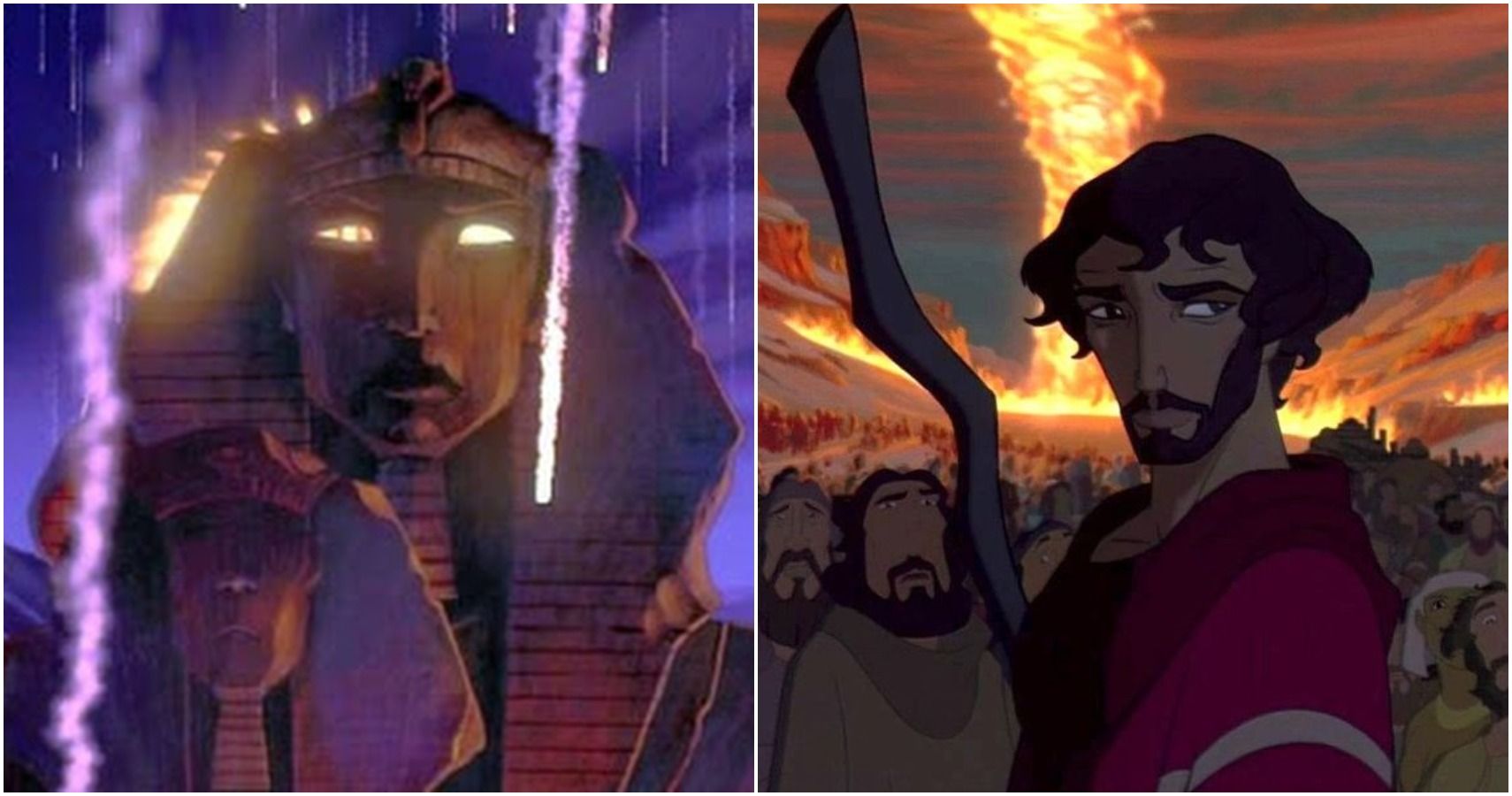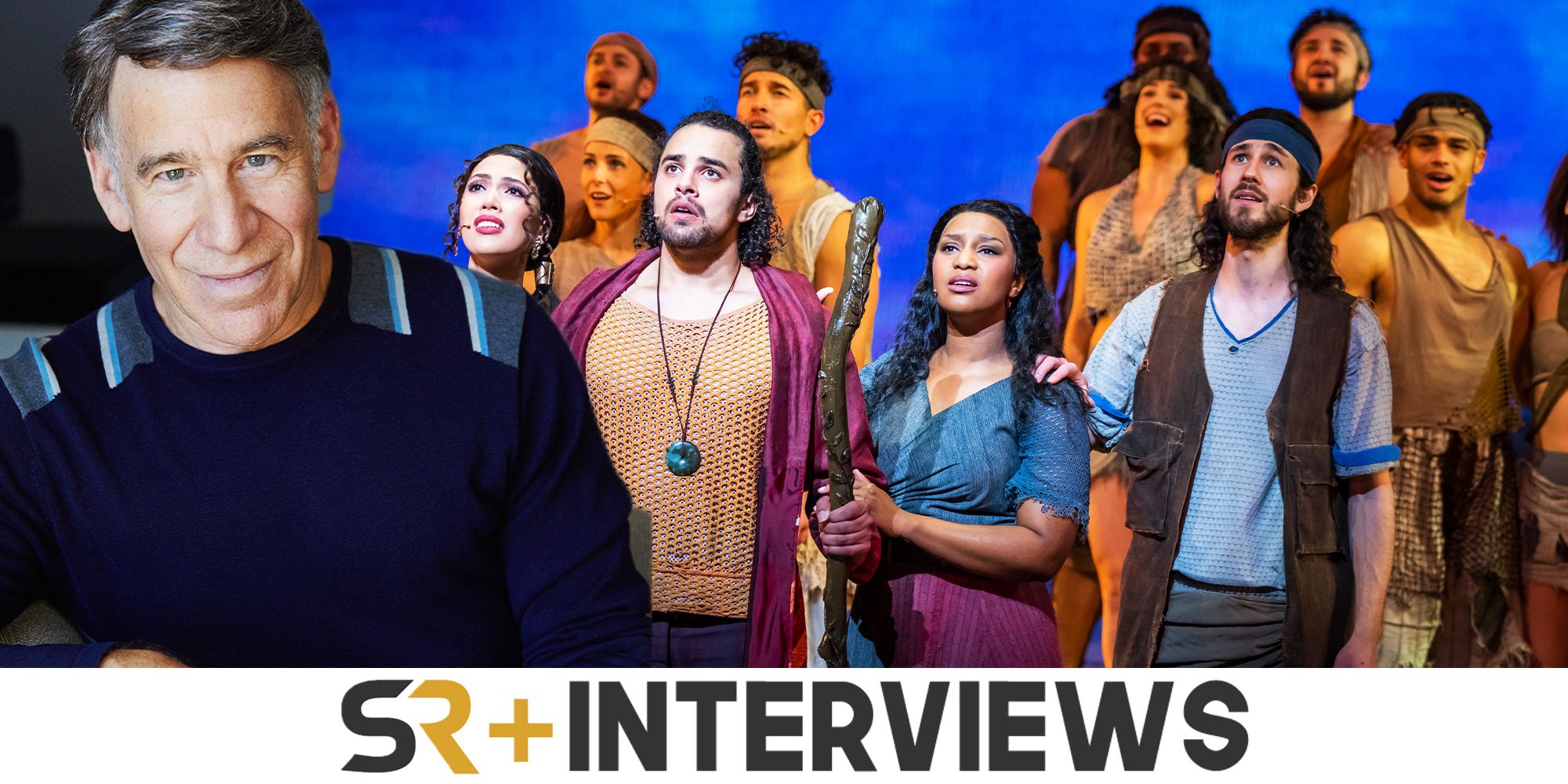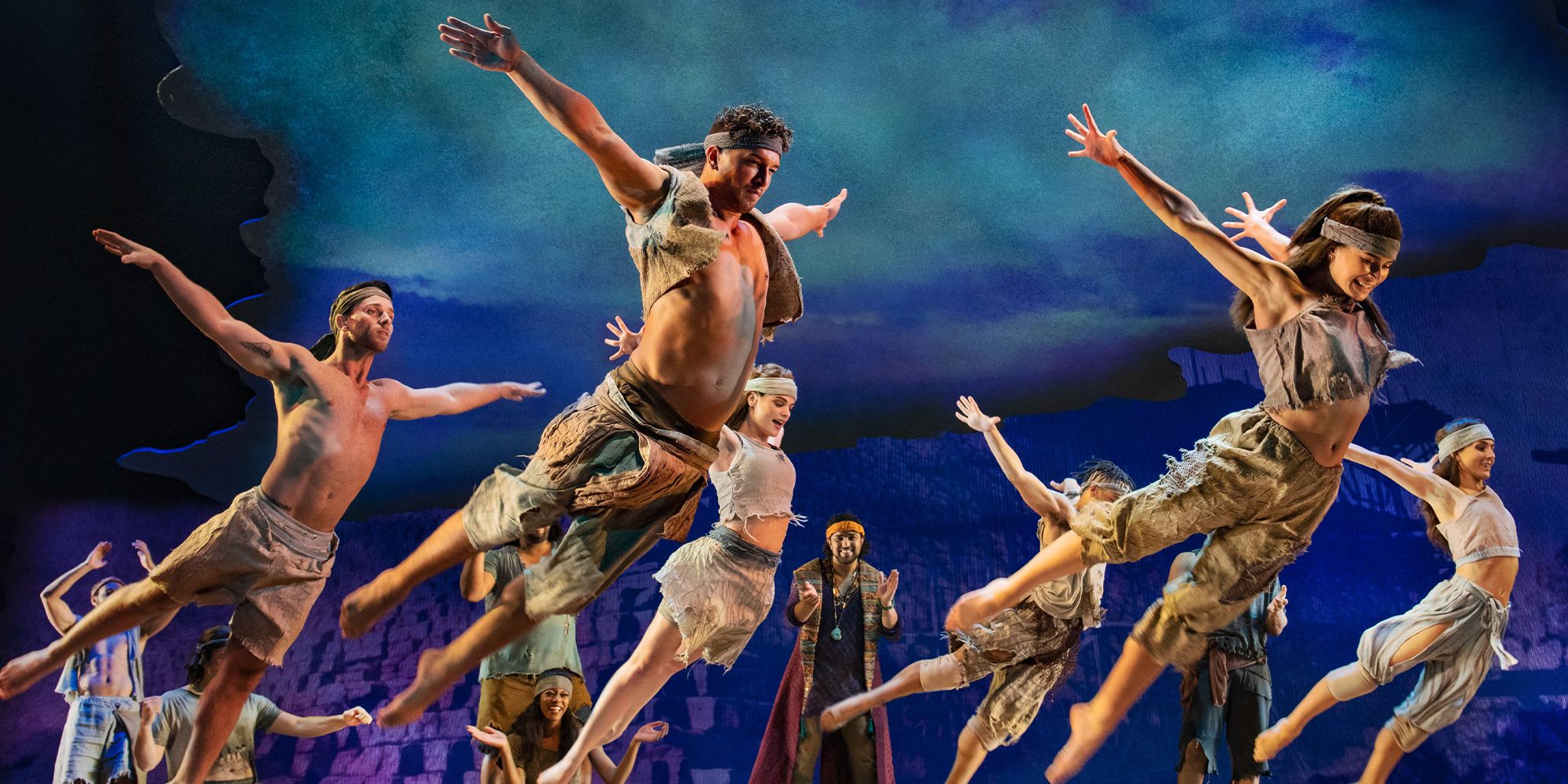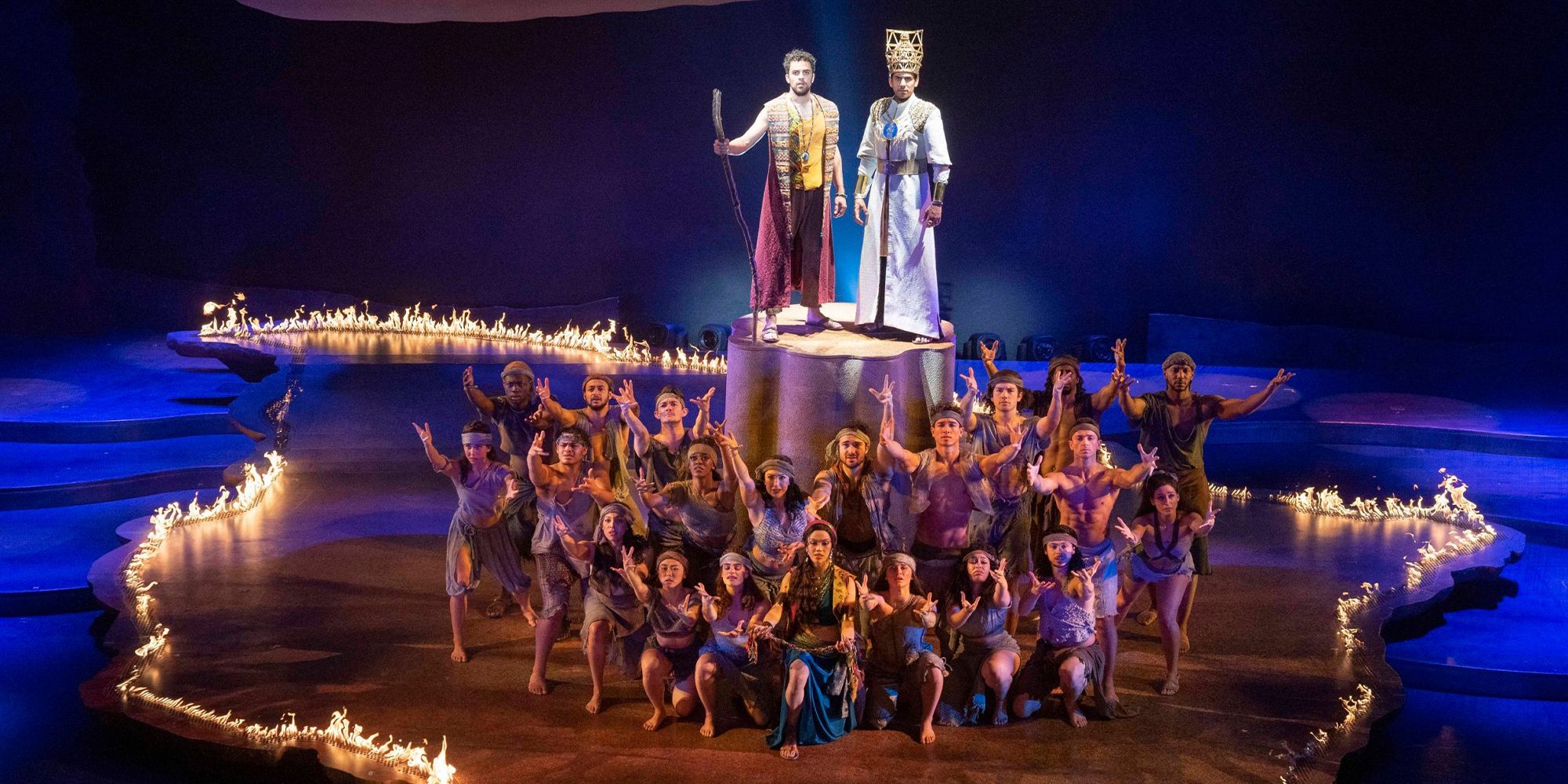Summary
- The Prince of Egypt: The Musical is a stage adaptation of the animated film, with the creative team from the movie involved in the production.
- Composer Stephen Schwartz utilized research and regional influences to create an authentic musical experience, incorporating instruments and melodic scales from the region.
- The show aims to expand upon the brotherly relationship between the two main characters and explore deeper emotional complexities, while also incorporating iconic songs from the original film.
The Prince of Egypt: The Musical is a stage adaptation of the 1998 DreamWorks classic film. The film, which recounted the story of Moses and the book of Exodus, was DreamWorks’ second animated feature and helped establish the studio as a serious contender in the space. The show premiered in 2017, and eventually made its way to London’s West End in 2020. While the show closed in January of 2022, The Prince of Egypt: The Musical was filmed as a movie and is available to buy and rent on digital platforms starting December 5th courtesy of Universal Pictures Home Entertainment.
The Prince of Egypt: The Musical benefitted from a creative team that carried over from the animated film. Screenwriter Philip LaZebnik returned to write the book for the show, and legendary Broadway composer and lyricist Stephen Schwartz brought his musical abilities to bear, both in adapting songs from the animated movie and in creating brand new ones. Scwhartz’s list of contributions to the world of theater is vast; he previously wrote the music for the mega-hit show Wicked, and is also involved in the upcoming Wicked movie. Schwartz also wrote the music for Disney hits like Enchanted and its sequel.

10 Hidden Details You Completely Missed In Prince Of Egypt
From the incredibly high budget to the stage musical, here are 10 things about the DreamWorks classic The Prince of Egypt that you probably missed.Stephen Schwartz spoke with Screen Rant about taking a story from animation to the theater, crafting the right musical theater lyrics, and more. Note: This interview has been lightly edited for length and clarity.
Stephen Schwartz On The Prince Of Egypt: The Musical
Screen Rant: You’ve adapted The Prince of Egypt for the stage. You did Disenchanted last year, and you have Wicked coming up next year. What is it like to have spent this time expanding upon worlds you've already created?
Stephen Schwartz: I love movies, but I never expected to be “in the movies”. I was always a theater guy; that's what I planned to do, until I was fortunate and Disney called [saying] that they needed someone to come work in animation. That just started a whole other area of work that I could do, and it’s just taken off from there.
It’s really fun to work in movies. It’s a different process. [In] theater, you just get all in the mud together and roll around, get your hands dirty, et cetera, and film is more divided in terms of who does what. It's not as immediately collaborative--there are good things and less good things about that--but it's fun to do something different and play in different sandboxes.
On that collaborative nature, what was your involvement in making sure the big set piece moments from the animated film were translated as well as they could be to the stage?
Stephen Schwartz: That was the goal of everybody working on the piece. Scott, the director, and the producers, et cetera, wanted to make sure that the big set pieces, “Deliver Us”, “When You Believe”, and “Through Heaven's Eyes” were realized effectively on stage. Then, of course, we wanted to expand on those. There are new songs. Also, [we were asking], “How do you take something which--even in animation--has been depicted, very, very realistically, as film does, theatricalize it, and allow the audience's imagination to come into play?” I think trying to solve that was a lot of what everybody worked on.
I saw in an interview where you were talking about how you leaned into melodic scales and instruments that were more appropriate to the region. Can you talk about the process of learning about that, if you had to, or utilizing that in the musical?
Stephen Schwartz: I definitely had to learn about it, and I did a lot of research when I was first writing the animated feature. I listened to a lot of recordings from the region, like Hebrew lullabies, folk songs, and instrumental recordings of oud and other instruments that are very specific. I found a recording that purported to be the music of the ancient Egyptian court; how that was possible, I don't know, but it sounded authentic. I even listened to pop music that I bought on the streets of Cairo to hear how they used percussion within a pop context that might be different from what we knew in America.
I had all that research, and then tried to utilize it in the composing for the film, so when it came time to do the stage show, I went back and listened to it again. Then, my orchestrator, August Eriksmoen, is particularly good at cultural authenticity in terms of shows that he's done. He also did a lot of research and learned how to play some of the guitar-like instruments. We utilized them in the orchestra, which was one of the fun things about doing this.
I was just watching an old an in-studio video of Mariah Carey and Whitney Houston singing “When You Believe”. When you've had work that’s been performed by legends like that, does that color how either you or the cast approach it when it comes time to do it on stage?
Stephen Schwartz: Of course. When we did “When You Believe” on stage, it was within the context of the show. It has the Hebrew Ashira section in the middle, which doesn't exist in the pop version, and no one is doing crazy vocal riffs because it would be out of character. Obviously, there’s an awareness that this is the hit song, but I think, in a way, you just have to ignore that. Everybody has to feel like we're telling our story, we're staying in character, this is what's happening emotionally at this point in the story, and we just have to do that.
Did you have a character or a relationship that was the most exciting for you to expand on, transitioning from the film to the stage?
Stephen Schwartz: I would say two things. The film was always conceived--from the moment Steven Spielberg said this is what we should do--as a brother story. It was Steven who said that he wanted it told as the story of these two young men who grow up together, who love each other, two young men of privilege, and then their destinies take them in the direction where they become antagonists; [a] ‘can their love overcome that?’ kind of thing.
We tried to go deeper into that in the show and explore it in more complexity. As part of that, we added the character of Nefertari, who was Ramses’ betrothed and then his wife, [who] then ultimately becomes his real wife through the tragedy that they experience together. I like the addition of that character very much. First of all, I thought it helped give more three-dimensionality to Ramses. Also, I'm attracted, in any story, to characters where you meet them, you think you know exactly who they are, and then, over the course of the story, you find out that you weren't looking deep enough.
I've been reading the Stephen Sondheim books, Finishing the Hat—
Stephen Schwartz: Those are fantastic, those two books.
Yeah. He talks about “America” in West Side Story, and about how certain lyrics didn’t land, and it made me curious; in writing new songs for this, and in all of your other work, is there something that makes a lyric successful in your eyes?
Stephen Schwartz: Well, I will quote or paraphrase a lot of what Stephen Sondheim says, because one of the things he points out is that lyrics are heard at the speed at which there are sung. It's not poetry; you're not looking on the page and having a chance to go back and reread a line. It just comes at you like speech, but it's harder to hear than speech, and harder to understand. One of the jobs, I think, of a lyricist--whether I'm working to my own music or I'm collaborating with someone like Alan Menken on his music--is to make sure that the audience can actually hear the lyrics and absorb them at their speed.
Also, in a strange way, lyrics need to stay out of the way of the music. The emotional message is being carried by the music, not by the words, so the lyrics need to support that, but not get in the way of that. At least, that's sort of my approach to it. It’s a real craft. In some ways, writing music is an art because so much of it is instinctive and sort of below consciousness, and lyric writing is very much a craft.
I love that distinction. In talking about adapting The Prince of Egypt for the stage, you said you had to reimagine the animated film. You've done that now in reverse with Wicked as well, in reimagining the stage for the screen. Is one harder than the other?
Stephen Schwartz: I think it may be a little harder to go from screen to stage because you have much more limited resources. Figuring out how to use theatricality, how to make the audience's imagination your co-conspirator and your co-creator… [theater] really involves an imaginative leap. I think going the other way, in a way, is about restricting yourself, and not just throwing every kitchen sink thing that you can do in the movies into it.
There are two things that are tricky about doing musical movies. I don't think it particularly pertains to Wicked because Wicked is in a fantasy world, but you have to get by how weird it is that people are singing at all, which we completely accept on stage, and we completely accept an animation because you're already suspending your disbelief, but movies are so literal that when a character breaks into song, it's really weird. You have to sort of earn the audience's permission to allow you to do that, so I think that's a big thing to overcome.
Then, there’s the fact that on stage, some of the most effective moments are [when] you put a fantastic singer in the middle of the stage, you hit him or her with three spotlights, and they sing for five minutes. It's thrilling. [You] can't do that in the movie. The camera has got to be moving and something's got to be happening visually.
What would it take for The Prince of Egypt: The Musical to come to Broadway?
Stephen Schwartz: Well, it's not really a question of coming to Broadway. Of more importance to all of us, I think, is having a show that can be licensed and done by different theatre groups all over the world, nad all over the country. That was the goal in creating a theater version of it to begin with, and now we're at the point where licensing can begin to take place. Bringing your show to Broadway is an economic decision on the part of producers and investors that may or may not happen, but sharing the story and the show with people around the country and around the world is, frankly, of more importance to all of us.
About The Prince Of Egypt: The Musical
Journey through the wonders of Ancient Egypt as two young men, raised together as brothers in a kingdom of privilege, find themselves suddenly divided by a secret past. One must rule as Pharaoh, the other must rise up and free his true people; both face a destiny that will change history forever.
The Prince of Egypt: The Musical will be available on digital platforms starting December 5th.



